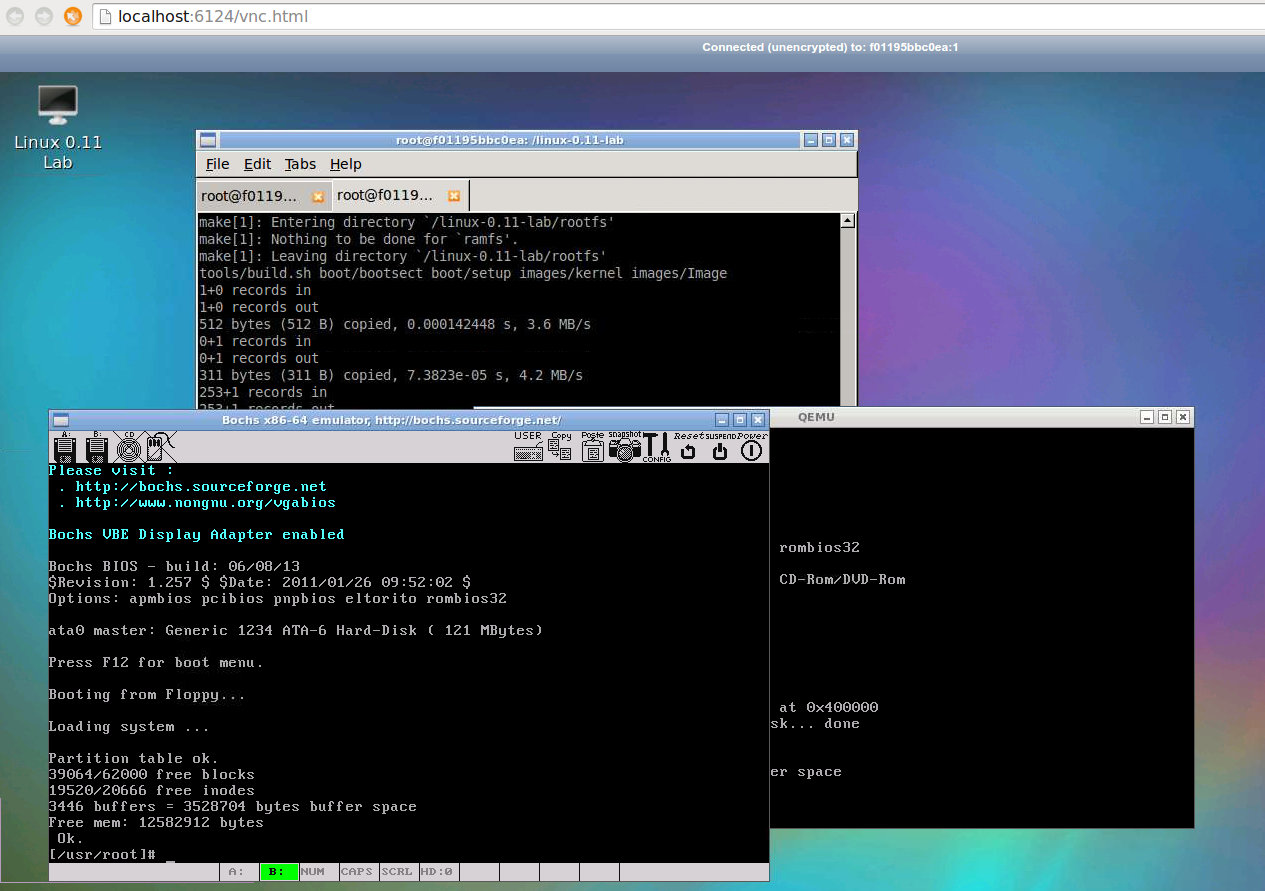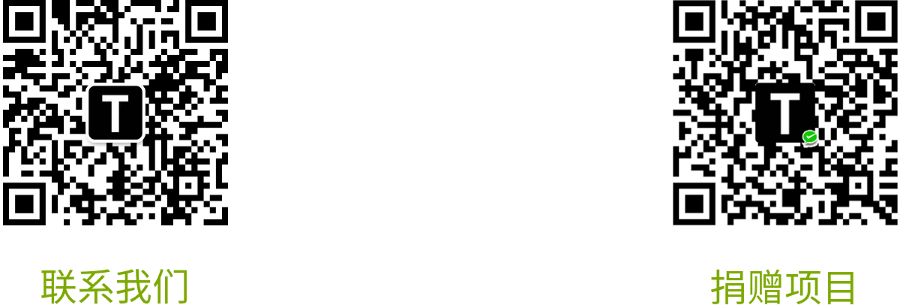The old Linux kernel source version 0.11 and the integrated experiment environment.
CS630 Qemu Lab is a related project, it is a friendly learning environment for the X86 assembly course: CS630.
If you want to learn the latest Linux Kernel, please try our Linux Lab
-
Basic information
- Homepage: http://tinylab.org/linux-0.11-lab
- Repository: https://gitee.com/tinylab/linux-0.11-lab
-
Features
- compilable with many different versions of Gcc.
- has been tested under modern Linux, Mac OS X and even work on Windows (with docker support).
- add bulit-in qemu and bochs support, include running and debugging.
- integrate different prebuilt rootfs (floopy, ramdisk and harddisk).
- allow to generate callgraph of every specified function
Linux 0.11 Lab works on Linux, Windows and Mac OSX, but please install docker at first, then simply install the environment with these three commands:
$ git clone https://gitee.com/tinylab/cloud-lab.git
$ cd cloud-lab/
$ tools/docker/run linux-0.11-lab
Notes: Some examples depends on minix fs kernel module, but the Linux kernel used by the docker of windows, macosx and even some Linux distributions may not provide such kernel module, please compile one yourself. Ubuntu is recommended.
Docker is required by Linux 0.11 Lab, please install it at first:
-
Linux, Mac OSX, Windows 10: Docker CE
-
older Windows: Docker Toolbox or Virtualbox/Vmware + Linux.
Notes:
In order to run docker without password, please make sure your user is added in the docker group:
$ sudo usermod -aG docker $USER
In order to speedup docker images downloading, please configure a local docker mirror in /etc/default/docker, for example:
$ grep registry-mirror /etc/default/docker
DOCKER_OPTS="$DOCKER_OPTS --registry-mirror=https://docker.mirrors.ustc.edu.cn"
$ service docker restart
In order to avoid network ip address conflict, please try following changes and restart docker:
$ grep bip /etc/default/docker
DOCKER_OPTS="$DOCKER_OPTS --bip=10.66.0.10/16"
$ service docker restart
If the above changes not work, try something as following:
$ grep dockerd /lib/systemd/system/docker.service
ExecStart=/usr/bin/dockerd -H fd:// --bip=10.66.0.10/16 --registry-mirror=https://docker.mirrors.ustc.edu.cn
$ service docker restart
If still have errors like 'Client.Timeout exceeded while waiting headers', please try the other docker mirror sites:
- Aliyun (Register Required): http://t.cn/AiFxJ8QE
- Docker China: https://registry.docker-cn.com
Configuration in Ubuntu:
$ echo "DOCKER_OPTS=\"\$DOCKER_OPTS --registry-mirror=<your accelerate address>\"" | sudo tee -a /etc/default/docker
$ sudo service docker restart
For Ubuntu 12.04, please install the new kernel at first, otherwise, docker will not work:
$ sudo apt-get install linux-generic-lts-trusty
If installed via Docker Toolbox, please enter into the /mnt/sda1 directory of the default system on Virtualbox, otherwise, after poweroff, the data will be lost for the default /root directory is only mounted in DRAM.
$ cd /mnt/sda1
For Linux or Mac OSX, please simply choose one directory in ~/Downloads or ~/Documents.
$ cd ~/Documents
This is a BAD method, but if really want a try, please comment 'DOCKER ?= yes' in Makefile at first:
Here is the deprecated method in Linux system:
-
The Linux distributions: debian and ubuntu (>= 14.04) are recommended
-
Install basic tools
$ sudo apt-get install vim cscope exuberant-ctags build-essential qemu lxterminal -
Optional
$ sudo apt-get install bochs vgabios bochsbios bochs-doc bochs-x libltdl7 bochs-sdl bochs-term $ sudo apt-get install graphviz cflow
-
Install xcode from "App Store"
-
Install Mac package manage tool: MacPorts from http://www.macports.org/install.php
-
Check your OS X version from "About This Mac", for example, Lion
-
Go to the "Mac OS X Package (.pkg) Installer" part and download the corresponding version
-
Self update MacPorts
$ xcode-select --switch /Applications/Xcode.app/Contents/Developer $ sudo port -v selfupdate
-
-
Install cross compiler gcc and binutils
$ sudo port install i386-elf-binutils i386-elf-gcc -
Install qemu
$ sudo port install qemu -
Install graphviz and cflow
$ sudo port install GraphViz $ sudo port install cflow -
Install gdb. 'Cause port doesn't provide i386-elf-gdb, use the pre-compiled tools/mac/gdb.xz or download its source and compile it.
$ cd tools/mac/ ; tar Jxf gdb.xz
Optional
$ sudo port install cscope
$ sudo port install ctags
$ wget ftp://ftp.gnu.org/gnu/gdb/gdb-7.4.tar.bz2
$ tar -xzvf gdb-7.4.tar.bz2
$ cd gdb-7.4
$ ./configure --target=i386-elf
$ make
Notes To enable kvm speedup for hardisk boot, please make sure cpu virtualization is enabled in bios features.
$ make help // get help
$ make // compile
$ make boot-hd // boot it on qemu with hard disk image
$ make boot-hd G=0 // Use curses based terminal instead of graphics, friendly for ssh login, exit with 'ESC+2 quit' or 'ALT+2 quit'
$ make switch // switch to another emulator, between qemu and bochs
Switch to use emulator: bochs
$ make boot VM=qemu|bochs // specify the emulator, between qemu and bochs
// edit .kernel_gdbinit(for kernel.sym) and .boot_gdbinit(for bootsect.sym and setup.sym) before debugging
$ make debug-hd // debug kernel.sym via qemu and start gdb automatically to connect it.
$ make debug-hd DST=src/boot/bootsect.sym // debug bootsect, can not debug code after ljmp
$ make debug-hd DST=src/boot/setup.sym // debug setup, can not debug after ljmp
Three different root filesystem images are stored in rootfs/:
- rootram.img -- RAM image
- rootimage -- Floppy image
- hdc-0.11.img-- Harddisk image
rootram.img is mountable directly:
$ mkdir /path/to/rootram/
$ sudo mount rootfs/rootram.img /path/to/rootram/
A new target ramfs-install is added to install files from examples/ to ramfs.
$ make ramfs-install
rootimage-0.11 is a minix filesystem, must with -t minix obviously:
$ sudo mkdir /path/to/rootimage/
$ sudo mount -t minix rootfs/rootimage-0.11 /path/to/rootimage
A new target flp-install is added to install files from examples/ to floppy image.
$ make flp-install
hdc-0.11.img has a partition table, should be mounted with an offset:
$ mkdir /path/to/hdc/
$ fdisk -lu rootfs/hdc-0.11.img
$ fdisk -l rootfs/hdc-0.11.img
Disk rootfs/hdc-0.11.img: 127 MB, 127631360 bytes
16 heads, 38 sectors/track, 410 cylinders, total 249280 sectors
Units = sectors of 1 * 512 = 512 bytes
Sector size (logical/physical): 512 bytes / 512 bytes
I/O size (minimum/optimal): 512 bytes / 512 bytes
Disk identifier: 0x00000000
Device Boot Start End Blocks Id System
rootfs/hdc-0.11.img1 2 124031 62015 81 Minix / old Linux
rootfs/hdc-0.11.img2 124032 248063 62016 81 Minix / old Linux
$ sudo mount -o offset=$((2*512)) rootfs/hdc-0.11.img /path/to/hdc/
A new target hda-install is added to install files from examples/ to harddisk image.
$ make hda-install
Some examples are stored in examples/ with their own README.md:
A new demonstration is added: Linux 0.11 Lab: Add a new syscall into Linux 0.11
Host:
$ patch -p1 < examples/syscall/syscall.patch
$ make start-hd
Emulator:
$ cd examples/syscall/
$ make
as -o syscall.o syscall.s
ld -o syscall syscall.o
./syscall
Hello, Linux 0.11
Notes If not examples/ found in default directory: /usr/root of Linux
0.11, that means your host may not have minix fs kernel module, compile
one yourself, or switch your host to Ubuntu.
Host:
$ make boot-hd
Emulator:
$ cd examples/linux-0.00
$ make
$ sync
Host:
$ make linux-0.00
Host:
$ make boot-hd
Emulator:
$ cd examples/linux-0.11
$ make
$ sync
Host:
$ make hd-boot
-
2015-03-15, falcon [email protected]
- launch a linux-0.11-lab project, see http://tinylab.org/linux-0.11-lab
- integrate prebuilt rootfs images, no need to install extra images
- integrate both qemu and bochs support and simplify the testing on emulators
- add callgraph generation support
- add docker support, allow to build the whole lab with one command
- rewrite the document: README.md
- Fix up "Reset-floppy Called"
- clean up everything
- repo: https://gitee.com/tinylab/linux-0.11-lab
-
2012-04-30, yuanxinyu [email protected]
- add Mac OS X support
- add latest Gcc support
- repo: https://github.com/yuanxinyu/Linux-0.11
-
2011-07-31, tigercn [email protected]
- port to new system and gcc
- see: http://www.oldlinux.org/oldlinux/viewthread.php?tid=13681
-
2008-10-15, falcon [email protected]
- add gcc 4.3.2 with 32/64bit host support
- rewrite boot/{bootsect.s,setup.s} with AT&T
- replace tools/build.c with tools/build.sh
- see: http://www.oldlinux.org/oldlinux/viewthread.php?tid=11651&extra=page%3D1
-
2005, jiong.zhao [email protected]
- write a book for Linux 0.11
- release a version for RedHat 9 with rootfs, compilers and blabla
- site: http://www.oldlinux.org
-
1991, Linus
- write and release the original Linux 0.11.
Our contact wechat is tinylab, welcome to join our user & developer discussion group.
** Contact us and Sponsor via wechat **


